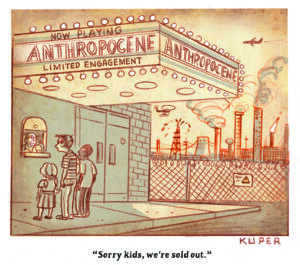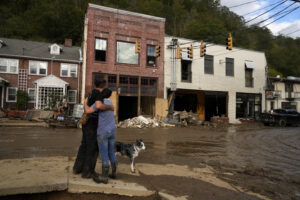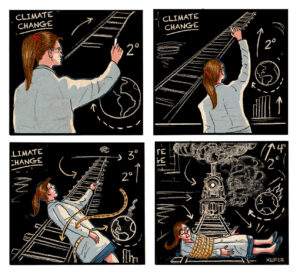People Who Are Stressed Pay Less Attention to Climate Change Images
Organizations campaigning to raise awareness of climate change should think carefully about where and when they broadcast their messages. Pat Pilon / Flickr
Pat Pilon / Flickr
By Inga Vesper / Climate News Network
Pat Pilon / Flickr
People who are stressed pay less attention to climate change images and struggle to be receptive to messages about its impact, a study has found.
Researchers from Switzerland used eye tracking to measure how much attention a group of test subjects paid to images illustrating climate change. The goal of the study, published in the Journal of Environmental Psychology, was to find out how everyday stress affects the attention that people pay to global warming, even when generally they have a pro-environment stance.
“The results of our study suggest that individuals might be more receptive if they are in a relaxed and unpreoccupied state,” says Silja Sollberger, a researcher at the University of Zurich’s department of psychology.
Based on their answers to a questionnaire, 71 men were split into two groups with either high or low environmental interest. They were then randomly put into stressful or control conditions and shown images related to climate change, alongside other negative images.
By measuring the eye movements of the test subjects, the scientists, from the University of Zurich and ETH Zurich, found that all the men, regardless of their environmental stance, paid less attention to negative imagery when stressed. This was true even for those men who were interested in climate change and considered themselves pro-environment.
The behaviour of the test subjects suggests that governments and non-profit organisations running climate change awareness campaigns should think carefully about where and when they broadcast their message.
“Climate campaigns might benefit from considering the mental state of target individuals at the time they are being approached,” says Sollberger.
“For example, it might be more successful to place climate change posters or to ask people for donations in recreational places – like parks, zoos and cinemas – and on weekends, rather than targeting commuters at a busy train station or employees during their lunch break.”
These findings are important, as budgets to raise awareness of climate change and educate people about its consequences are notoriously low.
Unesco, the UN’s Educational, Scientific and Cultural Organisation, has just $2 million a year to spend on climate change education, while the EU has a €63 million budget for climate action between 2014 and 2020. This compares with around $115 million a year spent by the fossil fuel industry on lobbying against climate change initiatives.
In their paper, the researchers admit that their selection of participant groups had an unintentional consequence. Men assigned to the unstressful conditions had on average higher incomes than those who were assigned to the stressed group. They wrote that low incomes contribute to chronic stress, which might exacerbate the effects of artificial stress placed on the candidates.
However, the researchers explain that the effects of stress on climate change interest observed in the study apply only to individuals. They say it is not possible to draw conclusions from their work about climate change attention in societies plagued by stress factors such as war or poverty.
Sollberger says that previous research has shown little difference between poor and rich countries in people’s attention to climate change. In fact, people living in poorer countries experience the impact of climate change much more strongly than those living elsewhere, which has a positive influence on their interest in the topic.
“Residents of poorer countries generally tend to be just as concerned about the environment, or more so, than residents of wealthier countries,” says Sollberger.
Your support is crucial...As we navigate an uncertain 2025, with a new administration questioning press freedoms, the risks are clear: our ability to report freely is under threat.
Your tax-deductible donation enables us to dig deeper, delivering fearless investigative reporting and analysis that exposes the reality beneath the headlines — without compromise.
Now is the time to take action. Stand with our courageous journalists. Donate today to protect a free press, uphold democracy and uncover the stories that need to be told.






You need to be a supporter to comment.
There are currently no responses to this article.
Be the first to respond.